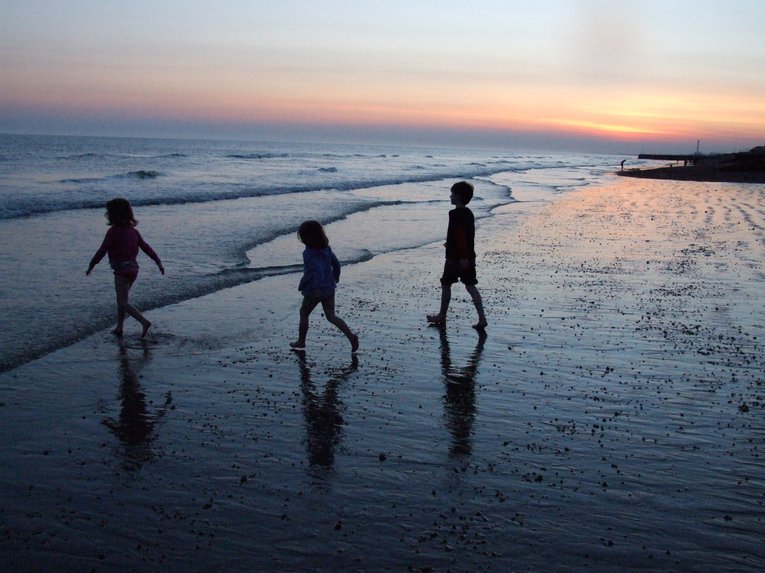
Bathing water quality: What needs to be done?
Today, Defra are celebrating the start of the bathing season in England. Today also marks 226 days since the water was last sampled for bathing water quality at over 400 beaches and inland waters across England.
From now until the end of September, bathing water quality will be sampled at over 400 beaches and inland waters across England. Almost 93% of those bathing waters are classed as having Good or Excellent water quality. Beachgoers can access live pollution forecasts at certain beaches, helping them choose the best time and location for swimming to minimise the risk of illness from pollution.
However, in England, the bathing season starts on the 15th of May and ends on the 30th of September. This means that those who aren’t averse to taking a dip during our colder months have been doing so without knowing what impacts it may have on their health.
We were delighted to hear that 27 new bathing water designations have been made across England. Bathing waters are a fantastic way for people to connect with the environment. That said, we believe there’s more that can be done to make bathing waters work for everyone.

Credit: Sue Ranger
How we’re driving change
Later this year, Defra will consult on proposals to reform the Bathing Water Regulations in England. We believe there is a lot that can be done to improve the current bathing water system. We will be calling for:
- Increased monitoring of bathing waters, including more frequent water quality sampling and extending the sampling period at beaches used outside of the current bathing season.
- For all samples taken to be included in bathing water assessments. Samples taken during pollution events should not be allowed to be ignored.
- For the definition of a bather to be expanded to be inclusive of all people using the water and the immediate beach vicinity. At present, only swimmers are included.
We also recently responded to the Environmental Audit Committee at Westminster on their Water Quality enquiry.
Why do we need to change how bathing waters are sampled?
During the 139 days of bathing water season, bathing water is sampled to determine its quality. The water is classified from Excellent to Poor, based on samples taken during the four preceding bathing seasons. This year, between 10 – 20 samples will be taken at each beach, but during some years it was as few as 5. That means that at some beaches, classifications are based on as little as 30 samples, representing just 5% of official bathing days. If you enjoy going in the sea year-round, it’s as little as 2%. In addition, up to 15% of samples taken can be removed from the classification if pollution is expected to affect the quality of the water and the public have been warned of the risk.
When research shows us that bathing water quality can change not only daily, but also hourly, is that really good enough?

Credit: Kate Wilson
From raw sewage to runoff from farmland, pollution can impact our beaches, making swimmers ill and threatening marine life. Pollution is more likely to happen in the winter, when it’s wettest. In fact, this winter was one of the wettest on record, and data from water companies confirms that this has led to thousands of spills from storm overflows.
The latest data published by the Environment Agency shows that in 2023, 14,031 storm overflows (where data was recorded) spilled a staggering 464, 056 times, totalling over 3.5 million hours. The data also shows us that spills happen throughout the year – during the bathing season and beyond.
Untreated sewage can also enter the environment through emergency sewage discharges, which should only happen when there is a mechanical or physical failure in the sewerage network. Last year, we discovered that less than 10% of emergency overflows in England are monitored. Those that are monitored are often being used repeatedly, demonstrating that current measures are inadequate to prevent pollution. This has been highlighted in recent news that Lake Windermere, a designated bathing water, was polluted in February when untreated sewage was discharged during an emergency.

Credit: Claire Edwards
How you can help
We all depend on the ocean in so many ways. Many of us rely on safe access to our local blue spaces for our wellbeing. To protect the ocean for both people and planet we are calling for the next UK Government to end all discharges of untreated sewage into the environment except under true emergency conditions or exceptional rainfall.
You can help by taking part in our campaign to urge political party leaders to prioritise the protection and recovery of the marine environment.
Our Manifesto for our Seas provides policy makers with 12 solutions to address the threats facing UK seas and to restore the health of our ocean so that when we visit the coast, we can enjoy it safely and for many years to come.
Together, we can bring about change to ensure our ocean is a safe place for both people and wildlife.
Find out more about water quality in your area and read our position on Bathing Water Quality today. The Bathing Season in Scotland starts a little later in June and we will be sharing more information on our work in Scotland in our next blog.

